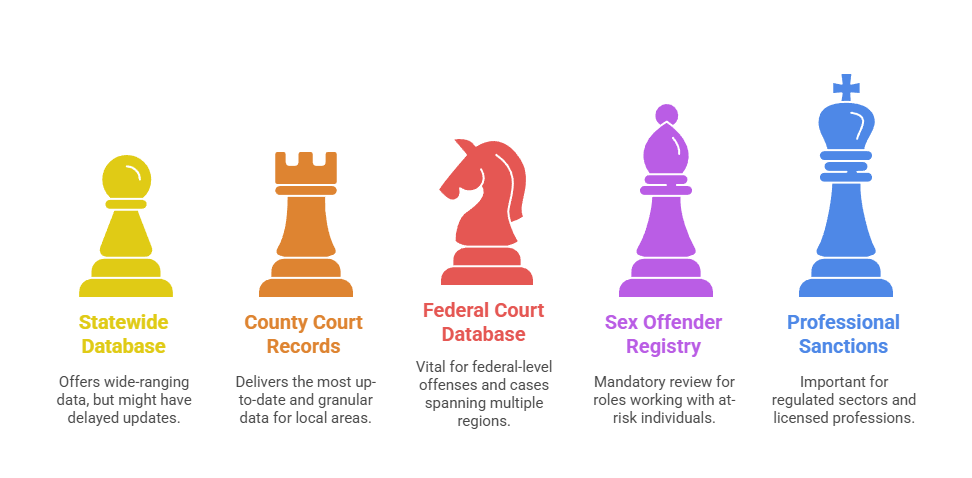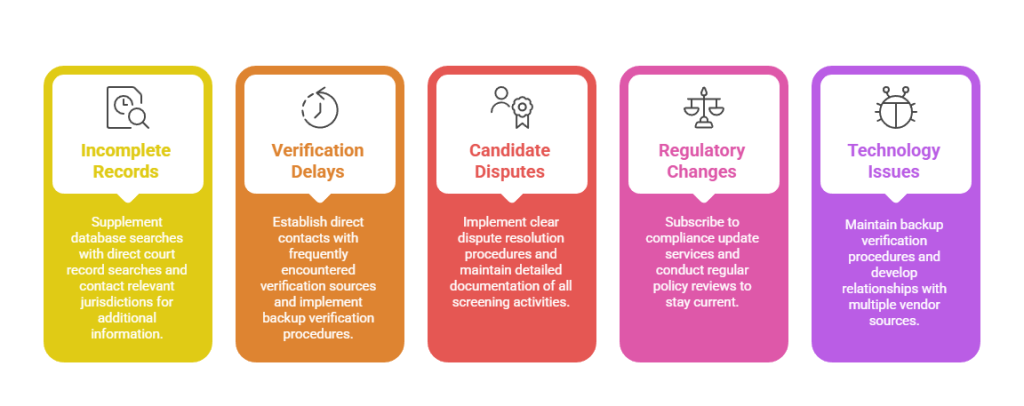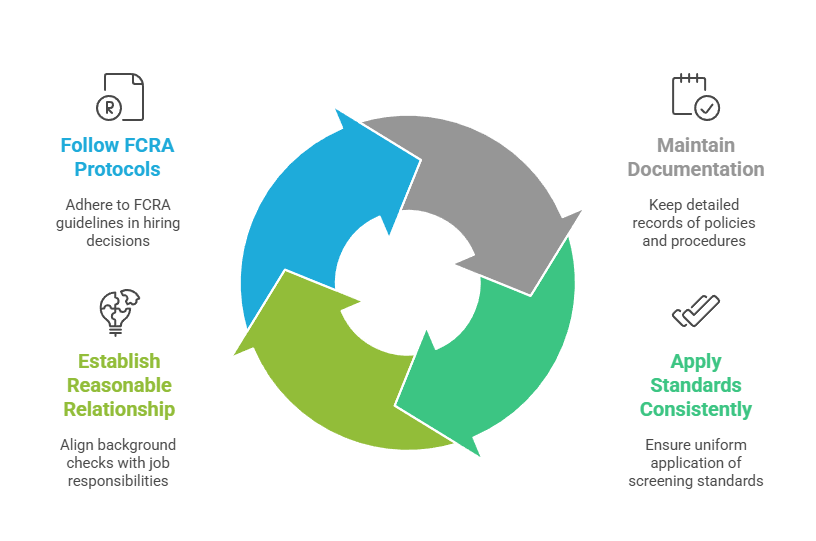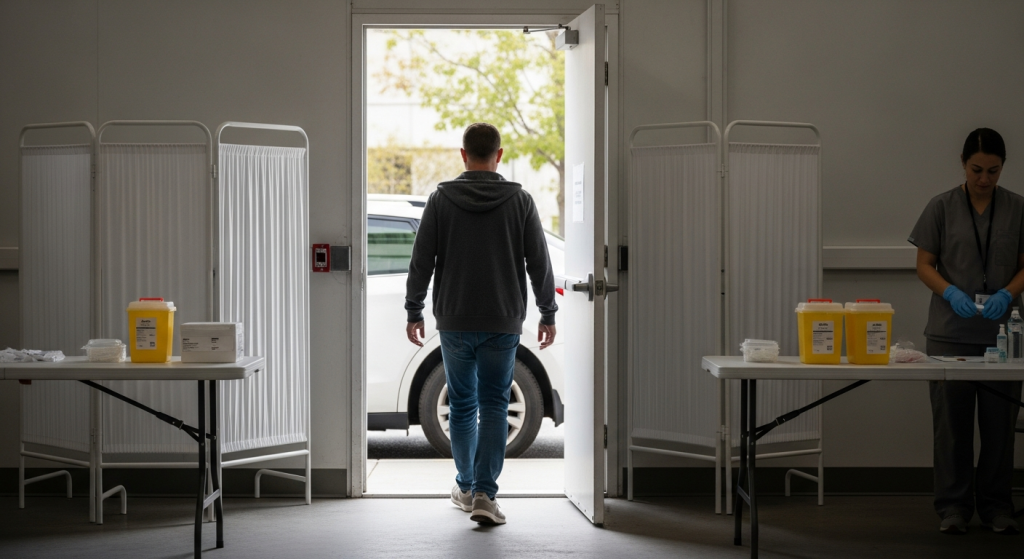Pre-employment screening in Texas operates under a business-friendly framework that allows employers significant flexibility while requiring compliance with federal FCRA regulations and state-specific criminal history reporting laws. Texas maintains no state-mandated waiting periods for background checks, making it one of the most employer-favorable jurisdictions for comprehensive candidate vetting.
Key Takeaways
- Texas employers can conduct comprehensive background checks without state-imposed restrictions, though federal FCRA compliance remains mandatory for all pre-employment screening activities.
- The state's "ban-the-box" legislation applies only to government positions, leaving private employers free to inquire about criminal history at any point in the hiring process.
- Oil and gas, healthcare, and technology sectors have industry-specific screening requirements that may exceed standard background check protocols.
- Texas criminal history records typically extend back seven years for most employment purposes, though certain regulated industries can access longer lookback periods.
- Employers must obtain written consent before conducting background checks and provide adverse action notices when making hiring decisions based on screening results.
- The Texas Department of Public Safety serves as the primary source for state criminal history records, while multi-jurisdictional searches may be necessary for comprehensive screening.
Understanding Texas Pre-Employment Screening Laws
Texas maintains a distinctly business-oriented approach to pre-employment screening. This framework offers employers broad discretion in their hiring practices. Additionally, it ensures basic protections for job candidates remain in place.
The state's regulatory framework primarily focuses on data accuracy and proper notification procedures. However, it doesn't restrict employer access to candidate information. This approach reflects Texas's commitment to supporting business growth while maintaining fair hiring standards.
Unlike many states that have implemented comprehensive "ban-the-box" legislation, Texas limits such restrictions to public sector employment only. Consequently, private employers retain full authority to inquire about criminal history. Furthermore, they can conduct background checks and make hiring decisions based on their findings throughout the entire hiring process. However, employers must still navigate federal regulations, particularly the Fair Credit Reporting Act, which governs how background screening information can be obtained and used.
Federal vs State Requirements for Background Checks
FCRA Compliance Standards
The Fair Credit Reporting Act serves as the primary federal framework governing pre-employment screening in Texas. It establishes mandatory procedures for obtaining and using consumer reports. Moreover, employers must provide clear written disclosure that a background check will be conducted, obtain the candidate's written authorization, and follow specific adverse action procedures if screening results influence hiring decisions. These requirements apply regardless of whether employers use third-party screening companies or conduct checks internally.
FCRA compliance becomes particularly complex when employers use consumer reporting agencies for background screening services. The law requires separate disclosure documents that contain only the background check authorization. Additionally, it prohibits employers from including this disclosure within broader employment applications or agreements. Employers must also wait a reasonable period between providing adverse action notices and making final hiring decisions, typically three to five business days.
Texas-Specific Criminal History Regulations
Texas state law primarily governs the accuracy and dissemination of criminal history information rather than restricting employer access to such data. The Texas Government Code requires that criminal history record information be accurate and complete when used for employment decisions. Furthermore, employers who obtain criminal records directly from Texas courts or law enforcement agencies must ensure they're accessing the most current information available.
The state operates under the principle that employers have legitimate business interests in knowing about candidates' criminal backgrounds. This is particularly true for positions involving financial responsibility, public safety, or access to sensitive information. However, Texas employers must still consider the relationship between criminal history and job requirements when making hiring decisions to avoid potential discrimination claims.
Types of Background Checks Available in Texas
Texas employers can access a comprehensive range of background screening options to evaluate potential hires effectively. Criminal history searches represent the most commonly requested screening type. Additionally, options range from county-level court records to statewide criminal databases. Employment verification, education confirmation, and professional license checks provide additional layers of candidate assessment. These tools help employers make informed hiring decisions.
The Texas Department of Public Safety maintains the state's central criminal history database. This system aggregates records from law enforcement agencies across all 254 counties. However, not all jurisdictions report consistently to this central system. Therefore, multi-jurisdictional searches become necessary for thorough screening. Private screening companies often combine multiple data sources to provide more comprehensive criminal history reports than single-source searches.
Financial background checks, including credit reports and bankruptcy filings, require additional FCRA compliance measures. Nevertheless, they can be valuable for positions involving monetary responsibilities. Texas employers must demonstrate that financial history relates directly to job duties before requesting credit information. Additionally, certain local jurisdictions have implemented restrictions on credit check usage for employment purposes. Professional reference checks and social media screening represent emerging areas of pre-employment screening. These methods require careful navigation of privacy laws. Furthermore, these screening methods can provide valuable insights into candidate character and work ethic. However, they must be conducted consistently and without bias to avoid discrimination claims.
| Background Check Type | Typical Cost Range | Processing Time |
| County Criminal Search | $15-25 | 1-3 business days |
| Statewide Criminal Database | $25-35 | Same day |
| Employment Verification | $20-30 | 2-5 business days |
| Education Confirmation | $15-25 | 3-7 business days |
These cost ranges reflect current market standards across Texas. Processing times may vary based on vendor efficiency and data source availability.
Industry-Specific Screening Requirements
Oil and Gas Sector Compliance
The oil and gas industry in Texas operates under heightened safety and security regulations. These regulations directly impact pre-employment screening requirements. Companies must conduct comprehensive background checks for workers accessing drilling sites, refineries, and pipeline facilities. This requirement stems from homeland security concerns and environmental protection requirements. The Transportation Security Administration's hazmat endorsement background checks represent just one layer of the multi-faceted screening process required for energy sector employment.
Drug and alcohol testing protocols in the oil and gas industry exceed standard pre-employment screening requirements. Many companies implement hair follicle testing that can detect substance use patterns extending back 90 days. Safety-sensitive positions require ongoing monitoring throughout employment. This includes random drug testing and periodic background check updates to maintain clearance levels.
Healthcare Industry Standards
Healthcare employers in Texas must navigate complex federal and state regulations governing background checks for workers with patient access. The Texas Health and Human Services Commission requires criminal history checks for employees working in nursing homes, assisted living facilities, and home health agencies. These checks must include searches of the employee misconduct registry and professional license verification. This ensures workers meet minimum qualification standards.
Hospital systems and healthcare networks typically implement more comprehensive screening protocols. These include education verification, professional reference checks, and ongoing monitoring of professional licenses. Healthcare workers with prescriptive authority or access to controlled substances face additional Drug Enforcement Administration background check requirements. These additional checks can extend processing times significantly.
Technology Sector Considerations
Texas technology companies often implement sophisticated background screening programs. These programs reflect the sensitive nature of their work and client requirements. Many tech employers conduct comprehensive checks that include criminal history, employment verification, education confirmation, and social media screening. This approach helps protect intellectual property and maintain client trust. Government contractors and companies handling classified information must meet additional federal background investigation standards.
The technology sector's rapid growth in Texas has led to increased scrutiny of candidate credentials. This is particularly true in software development and cybersecurity roles. Employers frequently verify technical certifications, conduct skills assessments, and perform detailed employment history verification. These steps ensure candidates possess claimed qualifications and experience levels.
Texas Criminal History Record Requirements
Texas criminal history record searches form the backbone of most pre-employment screening programs. These searches provide employers with essential information about candidates' legal backgrounds. The state maintains comprehensive criminal databases through the Texas Department of Public Safety. This department collects arrest and conviction data from law enforcement agencies statewide. However, employers must understand the limitations and gaps in centralized databases when designing their screening protocols.

- Statewide Database: Provides broad coverage but may have reporting delays
- County Court Records: Most current and detailed information for specific jurisdictions
- Federal Court Database: Essential for federal crimes and multi-jurisdictional offenses
- Sex Offender Registry: Required checking for positions involving vulnerable populations
- Professional License Sanctions: Relevant for licensed occupations and regulated industries
County-level criminal searches often provide more detailed and current information than statewide databases. This is particularly true for recent arrests and pending charges. Texas's 254 counties maintain individual court systems with varying reporting practices. Therefore, thorough criminal history screening becomes a complex undertaking that requires multiple search strategies.
The seven-year reporting limitation applies to most criminal history information used for employment purposes. However, certain convictions and serious felonies may be reportable indefinitely. Texas employers must balance their legitimate business interests in accessing criminal history information with federal and state requirements governing the use of such data in hiring decisions. Employers must develop clear policies regarding how criminal history information influences hiring decisions. These policies should consider factors such as the nature of the offense, time elapsed since conviction, and relationship to job responsibilities.
Compliance Best Practices for Texas Employers

Successful pre-employment screening programs in Texas require careful attention to procedural compliance and documentation standards. Employers must establish clear written policies that outline their screening procedures, decision-making criteria, and adverse action protocols. These policies ensure consistent application across all candidates. Additionally, these policies should address timing of background checks, types of screening conducted for different positions, and procedures for handling incomplete or concerning results.
Written consent remains the cornerstone of FCRA compliance. This requires employers to obtain specific authorization before conducting background checks through consumer reporting agencies. The consent document must be standalone and cannot be buried within broader employment applications or agreements. Employers should maintain signed consent forms and background check authorizations for all candidates. This applies regardless of whether they ultimately receive job offers.
Documentation standards extend beyond initial consent to include adverse action notices, background check results, and hiring decision rationales. Employers who maintain detailed records of their screening processes and decision-making criteria can better defend their practices. This becomes important if they face challenges from candidates or regulatory agencies. Regular policy reviews and staff training help ensure ongoing compliance as regulations and best practices evolve.
| Compliance Element | Documentation Required | Retention Period |
| Candidate Consent | Signed authorization form | 3 years minimum |
| Background Reports | Complete screening results | 3 years minimum |
| Adverse Action Notices | Pre and post-adverse action letters | 3 years minimum |
| Hiring Decision Records | Documentation of decision rationale | 3 years minimum |
Training programs for hiring managers and human resources staff should cover FCRA requirements, Texas-specific regulations, and company screening policies. Regular compliance audits help identify potential gaps in procedures. These audits also ensure consistent application of screening standards across different departments and locations.
Cost Considerations and Vendor Selection
Pre-employment screening costs in Texas vary significantly based on several factors. The scope of background checks represents the primary cost driver. Additionally, vendor selection and volume of candidates processed impact total expenses. Basic criminal history checks typically range from $15 to $50 per candidate.
Comprehensive screening packages including employment verification, education checks, and professional reference contacts can cost $75 to $150 per candidate. Employers must balance screening thoroughness with budget constraints. At the same time, they need to ensure they obtain necessary information for informed hiring decisions. Volume pricing arrangements with background screening vendors can significantly reduce per-check costs for employers with regular hiring needs.
Many vendors offer tiered pricing structures that provide discounts for companies conducting 50 or more background checks monthly. However, employers should prioritize vendor quality and compliance capabilities over cost savings. This approach helps avoid potential legal and regulatory issues. Vendor evaluation should include reference checks with existing clients, particularly those in similar industries or with comparable screening needs. Employers should request sample reports and documentation to evaluate vendor reporting quality and compliance procedures before making selection decisions.
Timeline and Processing Expectations
Background check processing times in Texas depend on the types of screening requested, data source availability, and vendor efficiency. Basic criminal database searches typically complete within 24 to 48 hours. However, comprehensive packages including employment verification and education checks may require five to ten business days for completion. Employers should build these timeframes into their hiring processes. This helps avoid delays in extending job offers to qualified candidates.
Employment verification represents one of the most time-consuming elements of background screening. This is particularly true for candidates with extensive work histories or previous employers with complex verification procedures. Some companies require written requests for employment verification. Others may take several days to respond to verification inquiries. Previous employers' responsiveness directly impacts overall screening completion times.
Education verification processing times vary based on the responsiveness of educational institutions and the age of degrees being verified. Recent graduates from local institutions typically have faster verification times. This contrasts with candidates with older degrees from out-of-state schools. Some colleges and universities have implemented automated verification systems that reduce processing times. Others still require manual processing that can extend completion timelines.
| Screening Component | Typical Processing Time | Factors Affecting Speed |
| Instant Database Searches | Same day | Database availability |
| County Criminal Searches | 1-3 business days | Court system efficiency |
| Employment Verification | 2-7 business days | Previous employer responsiveness |
| Education Verification | 3-10 business days | Institution verification procedures |
| Professional License Checks | 1-5 business days | Licensing board processing |
| Federal Criminal Searches | 3-7 business days | Federal court accessibility |
Employers should communicate realistic timeframes to candidates and maintain regular contact throughout the screening process. Clear communication helps manage candidate expectations. Additionally, it demonstrates professional hiring practices that reflect positively on employer brand.
Common Challenges and Solutions
Texas employers frequently encounter challenges related to incomplete criminal history records, slow verification responses, and candidate disputes regarding background check accuracy. Centralized criminal databases may not contain the most current information. This is particularly true for recent arrests or charges that haven't been fully processed through the court system. Employers must develop procedures for handling incomplete or questionable results while maintaining fair hiring practices.
Verification delays from previous employers and educational institutions can significantly impact hiring timelines. This becomes particularly problematic in competitive job markets where candidates may accept other offers while waiting for background checks to complete. Proactive communication with verification sources helps address these delays. Alternative verification methods, such as requesting pay stubs or transcripts directly from candidates, can help expedite the process while maintaining verification integrity.

- Incomplete Records: Supplement database searches with direct court record searches and contact relevant jurisdictions for additional information
- Verification Delays: Establish direct contacts with frequently encountered verification sources and implement backup verification procedures
- Candidate Disputes: Implement clear dispute resolution procedures and maintain detailed documentation of all screening activities
- Regulatory Changes: Subscribe to compliance update services and conduct regular policy reviews to stay current
- Technology Issues: Maintain backup verification procedures and develop relationships with multiple vendor sources
Candidate disputes regarding background check accuracy require careful handling to maintain FCRA compliance while protecting employer interests. Employers should establish clear procedures for investigating disputes and correcting inaccurate information. Documentation of efforts to resolve concerns becomes essential. Working with reputable background screening vendors who provide dispute resolution support can significantly simplify this process.
Legal Considerations and Risk Management
Texas employers must navigate complex legal landscapes when implementing pre-employment screening programs. Federal anti-discrimination laws, including Title VII of the Civil Rights Act, require employers to consider the relationship between criminal history and job requirements. The Equal Employment Opportunity Commission provides guidance on avoiding disparate impact discrimination. This occurs when screening policies disproportionately affect protected classes.
Negligent hiring liability represents another significant legal consideration for Texas employers. Courts may hold employers responsible for employee actions if they failed to conduct reasonable background checks. This liability becomes particularly relevant for positions involving public interaction, access to customer premises, or handling of sensitive information. Proper screening programs help demonstrate due diligence in hiring practices.
State and local fair chance ordinances add additional complexity to employment screening in Texas. While the state doesn't have comprehensive ban-the-box legislation for private employers, several cities have implemented local restrictions. Austin and Dallas have ordinances limiting when employers can inquire about criminal history. San Antonio has similar restrictions for city contractors. Employers operating in multiple jurisdictions must understand varying local requirements.

- Documentation Standards: Maintain detailed records of screening policies, procedures, and decision-making rationales
- Consistency Requirements: Apply screening standards uniformly across all candidates to avoid discrimination claims
- Reasonable Relationship: Ensure background check requirements relate directly to job responsibilities and business needs
- Adverse Action Procedures: Follow proper FCRA protocols when making hiring decisions based on screening results
Risk management strategies should include regular legal review of screening policies and procedures. Employment law continues to evolve, particularly regarding criminal history usage in hiring decisions. Employers benefit from staying current with legal developments and adjusting their practices accordingly.
Conclusion
Pre-employment screening in Texas offers employers significant flexibility to implement comprehensive candidate evaluation programs while maintaining compliance with federal and state regulations. Success requires understanding the interplay between FCRA requirements, industry-specific regulations, and best practices for consistent screening implementation. Employers who invest in proper procedures, vendor relationships, and staff training can build effective screening programs that support informed hiring decisions while minimizing legal risks. The state's business-friendly approach to employment screening, combined with proper compliance attention, creates opportunities for employers to build stronger, more reliable workforces through thorough candidate evaluation.
Frequently Asked Questions
Are background checks required in Texas?
Texas does not mandate background checks for private employers, though certain industries like healthcare and childcare have specific requirements. Employers have discretion to implement screening programs based on their business needs and risk management strategies.
What shows up on a Texas background check?
Texas background checks typically include criminal history, employment verification, education confirmation, and professional license status. The specific components depend on the employer's screening package and job requirements.
How far back do Texas background checks go?
Most Texas background checks report criminal history for seven years, though certain serious felonies and convictions may be reportable indefinitely. Some regulated industries can access longer lookback periods for safety-sensitive positions.
Can Texas employers ask about criminal history during interviews?
Yes, private employers in Texas can inquire about criminal history at any point in the hiring process. The state's ban-the-box legislation applies only to government positions, not private sector employment.
Do Texas employers need consent for background checks?
Yes, employers must obtain written consent before conducting background checks through consumer reporting agencies. The consent must be on a separate document and cannot be included within broader employment applications.
How long do background checks take in Texas?
Basic criminal searches complete in 1-2 days, while comprehensive packages including verifications may take 5-10 business days. Processing times depend on the screening components and vendor efficiency.
Additional Resources
- Texas Department of Public Safety Criminal History Records
https://www.dps.texas.gov/section/crime-records - Fair Credit Reporting Act Compliance Guide
https://www.ftc.gov/business-guidance/resources/using-consumer-reports-what-employers-need-know - Equal Employment Opportunity Commission Background Check Guidance
https://www.eeoc.gov/laws/guidance/enforcement-guidance-consideration-arrest-and-conviction-records-employment - Texas Workforce Commission Employment Law Resources
https://www.twc.texas.gov/businesses/employment-law-resources - Society for Human Resource Management Background Screening Resources
https://www.shrm.org/topics-tools/tools/toolkits/employment-background-checks - Professional Background Screening Association Best Practices
https://www.pbsa.org/resources/best-practices
Still have questions?
Get in touch with our team today for a personalized demo and discover how our tailored volume pricing and packages can drive results for your business!
How useful was this page?*
Note: your comments are anonymous. We use them to improve the website. Do not include any personal details.
Visit our FCRA Compliance Tool or leave a message here if you need a response.
From the blog Explore the GCheck Content Hub

Building a Strategic Screening Framework for International Hires in 2026
14 Jan, 2026 • 15 min read
Drug Testing Policies for Remote Employees: A 2026 Compliance and Strategy Guide
13 Jan, 2026 • 21 min read
Best Background Checks for Temporary Workers: A Strategic Framework for 2026
13 Jan, 2026 • 15 min readThe information provided in this article is for general informational and educational purposes only and should not be construed as legal advice or a substitute for consultation with qualified legal counsel. While we strive to ensure accuracy, employment screening laws and regulations—including but not limited to the Fair Credit Reporting Act (FCRA), Equal Employment Opportunity Commission (EEOC) guidelines, state and local ban-the-box laws, industry-specific requirements, and other applicable federal, state, and local statutes—are subject to frequent changes, varying interpretations, and jurisdiction-specific applications that may affect their implementation in your organization. Employers and screening decision-makers are solely responsible for ensuring their background check policies, procedures, and practices comply with all applicable laws and regulations relevant to their specific industry, location, and circumstances. We strongly recommend consulting with qualified employment law attorneys and compliance professionals before making hiring, tenant screening, or other decisions based on background check information.

